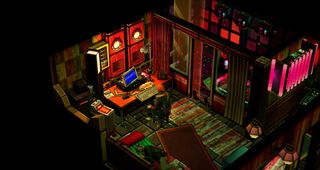2015 Personal Pick — Else Heart.Break()


Along with our group-selected 2015 Game of the Year Awards, each member of the PC Gamer staff has independently chosen one game to commend as one of the year's best.
I’ve always avoided games with hacking puzzles due to a lack of coding experience, and an unwillingness to learn to code. But I was given the task of reviewing Else Heart.Break(), and I’m glad I stepped up to the challenge. In this world, bits have replaced atoms, and it’s possible to hack into pretty much anything using a programming language called Språk. If a security door is locked, you can tinker with the code to give you access. Or, to give a more outlandish example, if you’re tired you can hack a glass of water to make it wake you up. Almost any object you see in the game can be manipulated in interesting ways, and the way the game threads this system into the story, puzzles, and world simulation is exceptionally clever.
It’s not just about hacking, though. Else Heart.Break(), as the name suggests, is a game about emotions. Hero Sebastian arrives in Dorisburg to work as a soda salesman. He doesn’t know anyone or where anything is. But the more you play the game and explore the city, the more you get to know it and its residents, and that’s when you meet Pixie. She’s the game’s love interest, but not in the traditional sense. When you meet her and she invites you to a party at a local club, you fully expect a romance to bloom. But she tells you almost immediately that she has a boyfriend. Not that this information makes Sebastian any less infatuated, of course. It’s a situation I found myself in when I was young, and the game is great at evoking these social complexities with warmth and heart. It’s the most human game I played this year.

One of my all-time favourite games is Shenmue, the infamous Dreamcast martial arts adventure by Sega and Yu Suzuki. I particularly love the way it makes you feel like you’re living a town, and Else Heart.Break() is the closest a game has come to recreating that sensation. At first Dorisburg feels alien, but it slowly begins to feel like home—mirroring Sebastian’s experiences and making you feel connected to him as a character. After 20+ hours there I know where certain characters will be at certain times of day, I know where Pixie and other people live, and I know how much money that German tourist at the hotel has in his bank account. I’m not proud of that last one, but after being sacked for failing to sell any soda, I decided to just steal a bunch of money by making creative use of my hacking tools. A bit evil, yes, but extremely effective.
What’s even more impressive about Else Heart.Break() is the flexibility of Språk. Experienced coders in the community have found interesting ways to use it to their advantage, such as creating a ‘skeleton key’ that brute-forces doors. Every locked door in the game has a numerical code attached to it, and a key implanted with this code will run through every number until it finds the correct one and opens it. It’s amazing that someone just figured that out by learning and studying the game’s BASIC-based programming language. It’s for this reason, and many more, that Else Heart.Break() is, personally, the most interesting, special game I played this year. The learning curve is steep, the camera’s a pain sometimes, and the lack of hand-holding can leave you feeling lost, but in light of how great everything else is, I can forgive its shortcomings.
PC Gamer Newsletter
Sign up to get the best content of the week, and great gaming deals, as picked by the editors.
If it’s set in space, Andy will probably write about it. He loves sci-fi, adventure games, taking screenshots, Twin Peaks, weird sims, Alien: Isolation, and anything with a good story.

OG Fallout lead Tim Cain defends the show's lore changes in a glowing full review—'Not that it matters, I'm not in charge of this anymore, and neither are you'

The long-awaited sequel to The Ur-Quan Masters hits its crowdfunding target in less than four hours, and they're not kidding about that $4.4 million stretch goal
Most Popular






